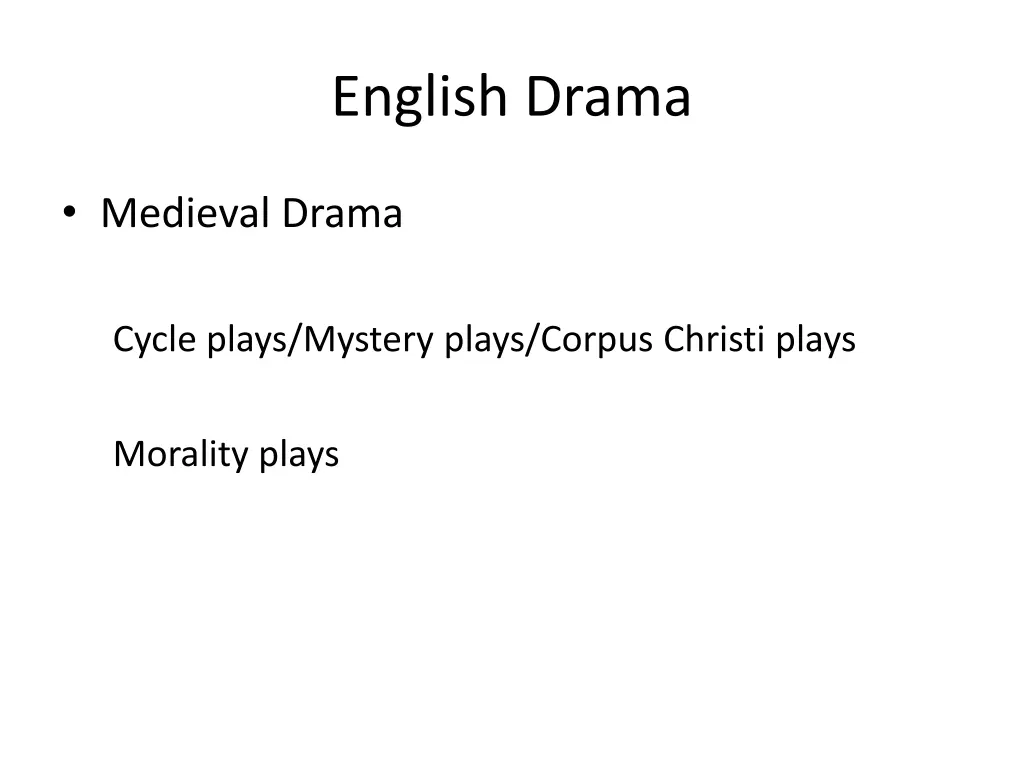
Exploring Christopher Marlowe's Dr. Faustus and English Medieval Drama
Delve into the world of Christopher Marlowe's iconic play "Dr. Faustus" and the rich tapestry of English Medieval Drama, including Mystery plays, Corpus Christi plays, and Morality plays. Uncover the themes, characters, and parodic structures that make these works timeless classics.
Download Presentation

Please find below an Image/Link to download the presentation.
The content on the website is provided AS IS for your information and personal use only. It may not be sold, licensed, or shared on other websites without obtaining consent from the author. If you encounter any issues during the download, it is possible that the publisher has removed the file from their server.
You are allowed to download the files provided on this website for personal or commercial use, subject to the condition that they are used lawfully. All files are the property of their respective owners.
The content on the website is provided AS IS for your information and personal use only. It may not be sold, licensed, or shared on other websites without obtaining consent from the author.
E N D
Presentation Transcript
English Drama Medieval Drama Cycle plays/Mystery plays/Corpus Christi plays Morality plays
English Drama Sixteenth-Century Dramatic Forms The Professional Stage (A-49) A-80 in 8thed
Dr. Faustus Christopher Marlowe The Overreacher Marlowe s Mighty Line Blank verse= unrhymed iambic pentameter
The Faustus Theme Set in Wittenberg Historie u. Geschichte Dr Johannis Faustus Goethe Modern Adaptations .
Dr. Faustus Parodic Structure Where else have we seen parodic inversion?
Dr. Faustus Prologue Icarus Prologue, line 15 ff. Overreacher Foreshadowing of Faustus story
Act I Faustus not content with his achievements Lines 10-11; 20-24 Drawn to black magic Line 49 ff
Dr. Faustus Faustus desires and expectations turning things upside-down Divinity should be highest Act I, line 37 ff It becomes lowest Line 106 ff Good Angel/Bad Angel form of allegory Line I.1.70 ff Medieval influence 7 Deadly Sins Sc. 5.278
Scene 1 Faustus dreams of power Colonizing the demon/spirit world Lines78-97 Lines 119 ff
Scene 3 Faustus conjures Anti-Catholic (line 25) Further example: Scene 7 (Pope) He is curious Mephastophilis tells him of the nature of hell: Line 76 ff
Scene 3 Faustus expects great power for his bargain Lines 102 ff.
Faustus What is the nature of hell? What does he get is he already there? See Scene 5, line 115 ff; line 135
Can Faustus be saved? Scene 5, line 194 ff. He believes he cannot repent
Comic Scenes Parodic Carnival What is the purpose of carnival? safety valve ? Stressing an essential humanity? Mixture of poetry and prose
Parodic pairings/Downward Spiral Scenes 3 and 4 (Faustus conjures/Wagner conjures) Scenes 5 and 6 (Faustus pledges/Robin and Rafe conjure) Scenes 7 and 8 (F tricks Pope/ Robin and Rafe call Mephastophilis) Scenes 9 and 10 (Faustus is in both scenes!)
Parodic Pairing Some claim this is a later interpolation But let s compare to Simpson s parody It s ridiculous to sell your soul for a donut, but what does Faustus really get for his bargain? Scene 4, line 8 does Faustus really get more than these low characters?
Faustus and Tragedy Tragedy Tragic Flaws Christian or Subversive Tragedy?
The Old Man Who is he? Can we relate him to the Pardoner s Tale?
The two versions of Faustus Page 1164-65 (9thed.) Page 1056-7 (8thed.)
